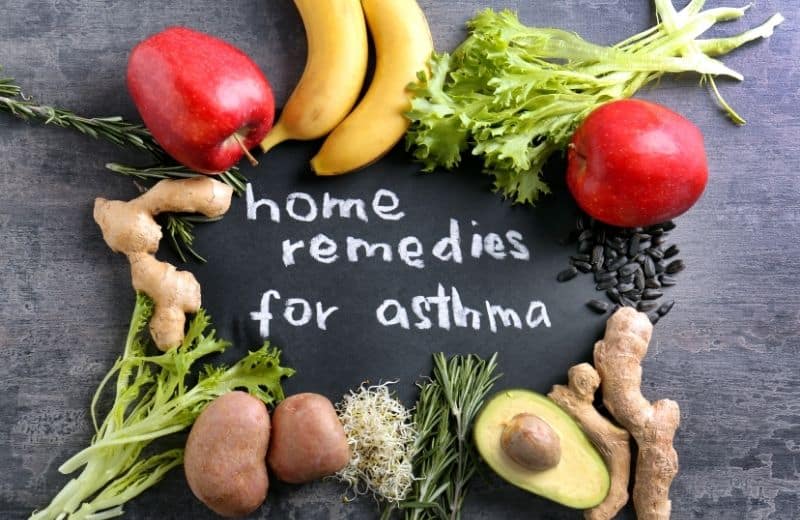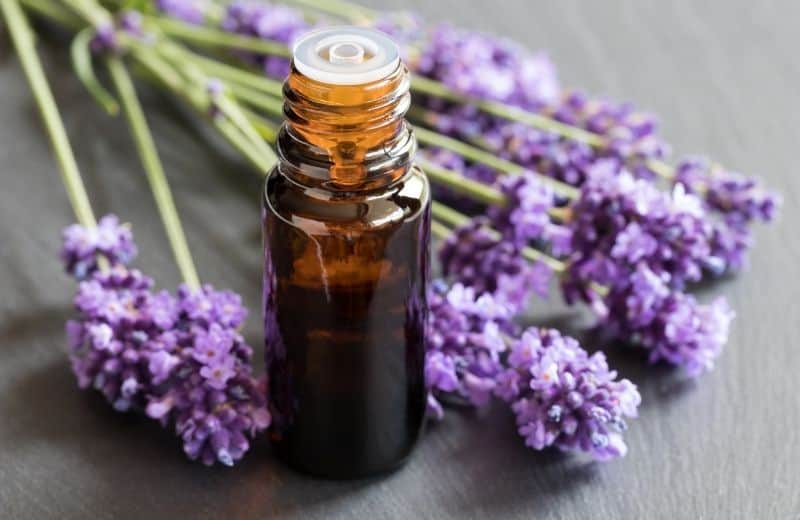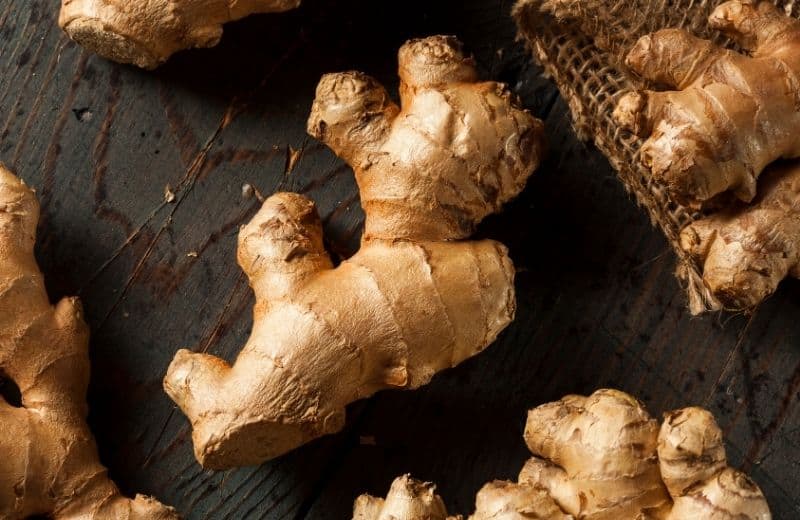Asthma is a long-term disease in which a person suffers recurrent attacks of shortness of breath and obstruction to airflow in the lungs. It happens in response to an allergic reaction. An acute asthma attack must be managed with proper medications and consultation with a doctor. You can use some natural home remedies for asthma as an adjunct treatment to control the severity of symptoms while continue taking your prescribed medication by your physician.1 2 3
Table of Contents
What is an Asthma Attack?
If you have asthma, keep your inhaler and emergency medications with you. Sometimes it is not a sudden onset, and it may take a while before it gets worse. You should know signs or symptoms if you are having or about to get an attack of asthma include:1 2
- You start coughing with shortness of breath and wheezing.
- You have used an inhaler, but it is not working to lessen your symptoms.
- You are too breathless to speak a sentence or eat or sleep.
- You feel like you cannot catch your breath.
- If you have a peak flow meter device and its reading are below usual
Triggering Factors for an Asthma Attack
There are both genetic and environmental factors behind the disease process. You may be allergic to one substance while another person maybe not. Even a sudden change of temperature or burst of air can stimulate your receptors, and al allergic flare begins to pour out. Identifying your triggers and avoiding them is probably the best strategy to keep your asthma at bay. Some of the most common triggering factor in people maybe:1
- Animal fur
- Dust
- Mold
- Pollen
- Smoke, including tobacco smoke
- Air pollution
- Cold air
- Emotions, like stress, can cause hyperventilation
- Having the flu or a cold
- Physical exercise
Home Remedies For Asthma
How natural remedies work in asthma? The underlying mechanism of the disease is an Allergen, which is any substance you are allergic to. Your lungs get sensitized, and when exposed again to that chemical, your lungs and air passage undergo a process of inflammation and spasm, which makes you hunger for air in an asthma attack.
So, either you must avoid that allergen or have a check on inflammation.1 Studies have suggested that diet has a significant role in controlling inflammation in general. Omega 3 fatty acids and a lot of other natural foods contain anti-inflammatory substances.
Additionally, controlling triggering factors such as anxiety and stress by some relaxation techniques are examples of how you can approach natural remedies to manage asthma. 2,3
1. Caffeinated Tea or Coffee
The caffeine in coffee and theophylline in tea belongs to the methylxanthine group of drugs popularly used in asthma treatment. They work by dilatation of the airway and improve breathing function. You can take coffee or tea as a daily routine in the morning and evening.
Several studies support the benefit of using caffeine or methylxanthines as they slightly improve the breathing function for up to 4 hours. It also reduces inflammation. It was used as the primary treatment before the discovery of newer drugs. But now due to its unwanted systemic side effects, it is no longer recommended as first-line treatment.4 5
2. Eucalyptus Essential Oil
Several essential oils contain anti-inflammatory properties, including eucalyptus oil. According to a research review of 2013, the active components in eucalyptus oil may be beneficial in reducing the mucus due to its decongestant properties and reduce the inflammation to ease breathing. Another research indicated the inhaling eucalyptus oil vapors might help people with asthma.
To use this, a wet towel beside your pillow while sleeping is enough to inhale its vapors during sleep. If you want to get more benefits, put some drops of eucalyptus oil in boiling water, and inhale its vapors.
However, beware of using such crude natural products that come in brands whose qualitative and quantitative assessment is doubtful. Also, one may be allergic to any of the component of this natural oil which may worsen the symptoms instead of improving.6, 7
3. Lavender Essential Oil
This is another essential oil works on a similar basis as eucalyptus oil described above. Some research data is available, suggesting slight benefits for people who have asthma. Inhaling vapors of lavender oil may reduce the inflammation and help relieve the symptoms of asthma caused by allergies. Choose a standard quality product while buying these natural products and do not keep them for use in an emergency.8
4. Omega-3 Oils
Omega-3 fatty acids block the inflammatory processes and are very healthy for general well-being. They must be part of your everyday diet. The anti-inflammatory properties help improve lung functions in asthma. If you are taking a high steroid dose for asthma, it may interact with omega-3 oils and render them ineffective. Consult your doctor before taking these oils as supplements.9
5. Garlic
Garlic has many health benefits as it has got anti-inflammatory properties. A study indicated that garlic might be beneficial in terms of reducing inflammation, which is a hallmark of asthma. Whether it is effective in reducing asthma flare-ups and exacerbations is still unclear due to lack of evidence .10
6. Ginger
Ginger has remarkable anti-inflammatory properties, and studies have indicated it may benefit in severe asthma. Ginger supplements improve the symptoms of asthma and reduce the need for emergency medicines at times. Does it improve the overall lung function or the whole disease process is still unclear? You can use herbal products containing ginger if you feel improvements in your lung function.11
7. Honey
Honey is a well known excellent home remedy for several common illnesses such as sore throat, cough, fever, and applying on wounds. It has got powerful antiseptic and anti-inflammatory characteristics. You can add one tablespoon to your tea or coffee on a regular to relieve symptoms of asthma and decrease the number of exacerbations of asthma.
One effective home remedy regarding the use of honey in asthma is the following: take one teaspoon of honey and half a teaspoon of cinnamon. Mix it in a cup of hot water and drink it before going to bed. It may taste bad a bit, but it will effectively remove mucous and relieve you a lot from breathing issues and asthma symptoms.12
Related: 10 Surprising Health Benefits of Honey
8. Carom Seeds
They are commonly known as Bishop’s weed or Aj. Carom seeds are popular in several cultures and used it as a home remedy for asthma for a long time. To use it, add one teaspoon of carom seeds in boiling water and inhale its vapors. Alternatively, you can make tea and drink.14
9. Steam Inhalation
Steam inhalation is common practice in common cold and influenza, which is generally advised to dilate the bronchi so that breathing is facilitated. In asthma, it may prove beneficial in terms of dissolving mucous plugs, which may be blocking airways.
Do not try them in an asthma attack as it may not give any benefit there. It is helpful in mild symptoms effectivity of steam inhalation is enhanced if you add some essential oils to it.15
10. Magnesium
Magnesium is a well-known element in medical research for its essential roles in metabolism and muscle relaxation properties used in several types of muscle spasms. Whether it is related to the stress of anxiety or bronchospasm, magnesium effectively relieves your spasms by relaxing your muscles. The foods rich in magnesium are greens, nuts, seeds, beans as well as cocoa.16
11. Turmeric
Turmeric is commonly available in every home used in several dishes. It has bed studies for its anti-allergic and anti-inflammatory properties. Besides numerous general health effects, it also has some role in asthma. But whether it is useful as a supplement or home remedy, there is not sufficient data available in this particular aspect.17
Related: 10 Most Incredible Turmeric Health Benefits
12. Figs
The health benefits of figs have been known in several cultures and the medical profession for years. It has remarkable properties to boost immune function. Their unique property to drain phlegm is what benefits asthmatics. To use this remedy, wash three or four figs and put them in water overnight and take it before eating any other thing in the morning along with the water. This remedy will take several months before showing its beneficial effects.
13. Lemons
Enriched in vitamin C and antioxidants, lemons have uncountable health benefits, and it is usually underrated. Ranging from your skin freshness, metabolism, immune function, common cold, and respiratory illnesses, lemons are a heavenly gift. Using lemon in any way, either adding in green tea or making lemonade weak or strong whatever taste or sweetness you like, is beneficial in asthma and general health. It will reduce the severity of symptoms and frequency of attacks.18
14. Breathing Exercises
A research review of 2014 suggests that regular breathing exercises such as Buteyko Breathing Technique may help improve asthma symptoms and reduce the need for reliever medications in the long term. The exercise aims to reduce hyperventilation and emerged in the idea of relaxation and meditation.13
- Buteyko Breathing Technique
This technique involves breathing through your nose. Take slow and deep breaths, moving your abdomen thoroughly, and then exhale after holding a bit. This will help your lungs improve their capacity and relax your muscles. Breathing through the mouth instead may dry out your air passage and makes it more sensitive for infections and allergies.13
- Yoga
Yoga incorporates several breathing exercises, meditation, and muscle stretching, which will increase your muscular endurance to help breathe more efficiently and take control of your stress and anxiety, which is a triggering factor for an asthma attack. The breathing techniques in asthma may help decrease the severity and frequency of asthma attacks.2
15. Mindfulness
Stress and anxiety are considered aggravating or triggering factors for an asthma attack for some people. Mindfulness is a meditation technique that involves focusing on your thoughts and emotions at the present moment and analyzing them.
All you need is to sit in a quiet alone place and focus on your thoughts and feelings. It has stress-relieving effects which will complement your medications to help maintain control over symptoms of asthma.
Related: 11 Benefits of Meditation on Mental Health
When to Get Medical Help?
Many times, only one or two puffs of your inhaler are sufficient to relieve all of your symptoms. Stay calm and breathe deeply. Follow the advice if you think its an asthma attack:2
- Sit upright as it will increase airflow and try to take deep relaxed breaths
- Do not panic as stress will aggravate your symptoms
- Take a puff of your reliever inhaler after every minute. You can take up to 10 puffs if needed.
- Call to rescue and the emergency medical facility near you
If you still not feeling well, you should rush to the nearest emergency facility.
Preventing Asthma Attacks
The following advice can help you reduce your risk of having an asthma attack:1 2
- Follow your treatment plan
- Have regular follow up with your doctor at least once a year
- Make sure and get checked you are using your inhaler correctly
- Avoid factors or substances that trigger your symptoms
If your symptoms are worsening and you need to use your reliever inhaler more than usual, make an appointment and get your detailed assessment.
Advice for Friends and Family
Your friends and family should know your asthma action plan. You should make copies of your action plan and give it to your family member or friends so that they may rescue you in need.2
Some of the natural and home remedies may reduce the symptoms and severity of asthma. You can try and continue if you feel benefits with the advice of your doctor and continue taking your essential medicines regularly. Never rely on them in case of an asthma attack. Use your reliever inhaler. Use only one remedy at a time, and if you notice any side effects, stop using that right away. Medical and research data is insufficient to support any of the herbal or home remedies as an alternative treatment for asthma.





